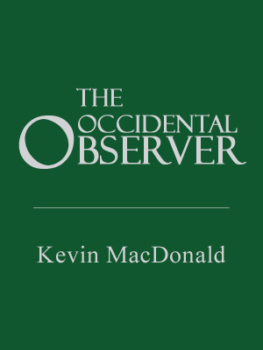Student Life and the Alt-Right: Reply to Prof. Griffin
As a relatively new movement—some 10 years old now—the alt-right, like any such movement, must be open to continual refinement and articulation. Thus it is both to be expected, and welcome, that we get a range of opinions from diverse perspectives. People have different experiences and different knowledge bases, and they naturally approach such a topic from different angles. This is especially true here, given that we are dealing with a serious and potent social theory, one that furthermore comes into direct conflict with the prevailing power structures in the West. In such a case, we need to hear the pros and cons of our various ideas, especially from thoughtful and knowledgeable colleagues.
Thus I was pleased to read Dr. Robert Griffin’s critical reply (here) to my recent piece, “The ABC’s of the Alt-Right” (here). He shares a common background with me, and has a similar interest in campus life in particular—as do many contributors here, not the least, Prof. MacDonald. I can’t match Dr. Griffin’s 47 years of teaching, but I have been teaching at universities on and off (mostly on) since the early 1980s, which gives me well over 30 years’ experience. I have taught at three different American universities, and one foreign, in that time. Perhaps more to the point, throughout much of that period I have been actively involved with student groups and student activists, often serving as an official or unofficial faculty advisor; this experience helped to inform my previous essay. Though he does not say so explicitly, I get the impression that Dr. Griffin has perhaps less direct experience in working with student groups. Be that as it may, I will take a look at his many helpful remarks, to see if I can offer a response or rebuttal. After all, we share many of the same goals, and so it is certainly worthwhile to examine our different thoughts on how to arrive at them.
To begin with, Dr. Griffin jumps directly to my final section, “How to Organize.” I take this to mean that he is in broad agreement with the first two sections. My initial “Preamble” laid out some history and context of the dissident right, and identified the three pillars of alt-right philosophy: 1) biology is destiny, 2) Whites and White culture deserve defense, and 3) Jews pose an overriding threat to White interests. My short middle section offered a “brief manifesto” of White nationalism, summarizing its nine key points, and emphasizing the scientific, non-violent, and ‘non-hatred’ nature of such a view. The three pillars seem to be widely recognized, whereas the nine points of White nationalism are my interpretation of this worldview. Given that he offers no comment at all on these issues, I have to assume that Griffin accepts the general outline that I presented. This is unsurprising; as an alt-right forum advocating for White interests, any TOO contributor should naturally endorse such an outlook, broadly speaking.
The disagreements come in my final section, where I offer thoughts on how to promote and advance an alt-right view on college campuses. It goes without saying that there is no one “right way” to do this, and the wide variability in campus cultures, student bodies, local social attitudes, and individual student beliefs necessarily requires much flexibility in how to implement such a program. My original essay was, indeed, a “guide” in every sense of the word: guidelines and recommendations, thought-starters and practical advice. It was never intended to lay down the law on student alt-right activism.
In that section, I gave 31 bullet-point items of brief discussion. Griffin offers critical commentary on 13 of these; hence I presume that he has little or no objection to the remaining 18 (it’s always good to note points of agreement). Thus we will focus on the points of contention.
(1) Students have more power than they think.[1] Griffin emphasizes the difference between individual and collective power. Yes, of course, any one student has only a microscopic impact on university finances, as does any one taxpayer with respect to his state or federal government. My main point was that students are, in large part, funders of the university; they (or yes, their parents) are the paying customers; and as such, they have all the rights of any paying customer. They have the right to be treated fairly and with respect. They have the right to complain. They have the right to point out abuses or incompetence on the part of their “employees.” And they have no particular obligation to their fellow paying customers, provided that they follow the broad rules of behavior that apply equally to all. That said, I see no real point of disagreement here. Yes, it’s more complicated than taking your money elsewhere, but the principle is the same. You pay (a lot!), and you have rights. Don’t let your “employees” tell you otherwise.
(2) Stay within the rules of the university, and they can’t punish you. Here, we begin to get into more substantive disagreements. Dr. Griffin seems inordinately sensitive to negative opinions of others. Or at least, he is imputing such sensitivity to many (most?) students. I guess it goes without saying that if you are a sensitive flower, don’t become an alt-right activist. Anyone bothered by “verbal disconfirmation,” “looks of disdain,” or not being called on in class is probably too immature to engage in contentious politics. Same with anyone affected by “put-downs, smirks, snubs, exclusion” or social media bashing. The movement needs young people with a thick skin and a strong backbone.
And I don’t know how things work at Vermont, but in my experience, a professor cannot simply dish out “bad grades” to students he doesn’t like. Sure, some things are subjective, but much is not. A biased professor is likely to get called out and have to explain himself. I have had many students whom I found distasteful, but I always gave them fair grades and never considered using grades as a weapon. Any such individual professor who might do that can usually be safely avoided.
Or is Griffin implying that masses of faculty—all Jewish professors, say, or all liberals—would recognize and collectively retaliate against a specific student? That’s highly unlikely, in my experience. But if the whole college is indeed out to get you, then you really are making a mark!
(3) Create an explicitly alt-right student group or club. Though I wouldn’t call it “centrist,” I agree that a pro-White movement is not intrinsically left or right on the political spectrum. As I noted, many liberals hold some conservative views, and many conservatives (even alt-righters) have some traditionally liberal opinions. If it’s true that many academics avoid self-labeling these days as liberal or left, that doesn’t mean that they are centrists; rather, they are crypto-leftists, which is worse. Griffin seems to want students to be crypto-rightists. In fact, he says as much later on, with his recommendation to be like the French underground in WW2, and his call for “secret meetings,” “pseudonyms,” “codes,” and so on. Certainly this is always an option, but it probably is not the preferred approach. Alt-right (or dissident right) students should be free—are free—to self-identify as such. And without penalty. That should not require defense in an alt-right forum like TOO, but apparently it does.
(4) Don’t make it a guy’s club. Dr. Griffin suggests that my brief manifesto would alienate young women. Sorry about that, but that’s the reality of the situation. I’m not generally in the business of reworking my philosophical views to please a particular gender or age-group. I try to tell the truth, straight-up, and I would hope that every thinking person, of all ages and both genders, would accept it as such. MLK’s ideas and values are not much help for us; nor are the Jewish-inspired techniques of emotional manipulation and pity-mongering. But here again, Griffin’s sensitivity training comes to the fore; his endorsement of “tugging at our heartstrings,” “making us feel sad,” and “getting us to emphasize” (sic erat scriptum—I presume he means ‘empathize’) are to no avail for the alt-right. But I agree with his other points here: yes, be patient about getting out your message; yes, focus on that which is unfair and hurtful to Whites.
(5) Stay agnostic on religion. Now we’re getting down to brass tacks. Based on a quick survey of his writing, I’m guessing that Griffin is a committed Christian. Unsurprisingly, he objects to my sidelining, and mild disparagement, of his religion. One might speculate that this, in fact, is at the root of his entire critique of my essay. This is unfortunate—but serves to prove my point.
I’ll say more about Christianity in a moment, but first I want to address two points he raises here. He suggests that the anti-Christian crowd is also the anti-White crowd, thereby implying that we Whites can’t trust—and certainly shouldn’t side with—any anti-Christians. The truth is this: Part of the anti-Christian crowd are Jews, of both orthodox and secular persuasion. There’s a lot to unpack here, but in short, the orthodox Jews oppose Christians on a theological basis, and the secular Jews on the basis of scientific materialism and rationalism. Both mock Christianity, but both are able to find some use in it as well, especially in its Zionist form. The other main group of anti-Christians are the secular, rationalist, and naturalistic Whites. These people, I would suggest, are among the toughest and most resolute White nationalists. Griffin’s ploy to link ‘anti-Christian’ and ‘anti-White’ fails to hold.
His second point is that alt-right students should use Christianity to their advantage. But he offers no concrete suggestions at all (Hey students, “see what you can come up with”). What, indeed, could one even plausibly “come up with,” in an alt-right sense, from a Christian point of view?
Given that it’s Christmas time, let’s take a minute to examine this matter a bit more closely. Consider this question: What in God’s name (so to speak) is even remotely pro-White about the Bible? I’ll tell you: nothing. The Old Testament was written by Jews, about Jews, and for Jews. It is resolutely anti-goyim. It is nothing more than a war manual for the defense of the Jewish race, along with some moronic theological cover. The New Testament was also written by and about Jews: Jesus, Mary, Joseph, 12 Apostles, Paul, ‘Mark,’ ‘Luke,’ ‘Matthew,’ ‘John’—all ethnic Jews. The chronology of events, furthermore, strongly suggests that Paul invented his demi-god Jesus, primarily, it seems, as a stunt to undermine Roman paganism and to draw in the gullible masses, to persuade them to worship the Jewish God and his “son.” With its emphasis on the presumed afterlife, Paul’s constructed theology was profoundly anti-life, anti-world, and anti-corporeality. He never believed in it—that artful liar—nor did any of his fellow Hebrews. Present-day Jews are laughing up their sleeve over the foolish Christians and their “love thy neighbor” and “turn the other cheek”; and of course, they are right there, first in line, ready to exploit that love.
There is no sense, then, in which the Bible is pro-White. In fact, the New Testament, rightly understood as an anti-Roman manifesto, is profoundly anti-White. At best, we might say that the Bible is pro-humanity. But even here, it is cloaked with an insidious Jewish leveling of all peoples, all “equal before God”—all except the Jews, who are first among equals.
The bottom line: Can anyone who worships a long-dead ethnic Jew as his god and personal savior really be alt-right? Really? Time to re-read pillar number three.[2]
(6) Name names, be specific in your critiques. Again, I don’t know the faculty culture at Vermont, but to suggest that aggrieved Jewish professors might have you “worked over” because of your alt-right views is rather shocking! (If so, stay away from Vermont.) And are they really going to haunt you after graduation? How in the world will they know which jobs you are applying for, unless they work for the Mossad? This comes across as little more than scare tactics—ones that the Jewish Lobby would certainly view with favor.
(7) Insults are a badge of honor. See my reply to (2) above. Again, if you are a delicate soul, one who is deeply wounded by name-calling, then by all means, don’t become an alt-right activist.
(8) Learn something about the real Nazis. Griffin overstates my point. I never said, “Cozy up to Hitler.” I said, learn something about him, his situation, and his movement. There is much of value to learn from history.
(9) Be visible. For starters, I am puzzled by my alleged “last sentence” of this item (“And be prepared to take shots for it”). Where did that come from? I didn’t write it, and it’s not in my essay now. In any case, yes, I agree, intentional visibility is optional. Word will get around soon enough, no matter what you do. Griffin, though, recommends the opposite—be invisible. Perhaps this is good advice. I leave it to each student, and each group, to chose the most appropriate strategy. I would prefer to see a confident group working fully above-board, but that may not always be prudent.
(10) An effective group may get shut down. Same reply as #9.
(11) Don’t get stuck on ideological labels. Griffin seems to generally agree with me here, and so no need to reply. Labels are vague and discretionary.
(12) Don’t be ‘woke.’ Griffin apparently views Black culture, and in fact all racial minorities, favorably. Of course, every ethnicity has a right to its own culture and values—but not here, not in this country. I certainly want Blacks, Hispanics, Muslims and so on to be happy, but in their nations of origin. Neither they nor we can be truly happy in a multiracial, multicultural mish-mash of a nation. Research data, evolutionary theory, and common sense all support this view.
(13) Speak the truth. …unless it starts to hurt, says Griffin, and then knuckle under. Just stay quiet, keep your head down, hold it in, “get along – go along,” grin and bear it, “cover your ass.” Or maybe, “Turn the other cheek,” as a Jew once said. Sorry, but I can’t do that. Millions do it, on a daily basis, but some of us have to lead. My original piece was not intended for the masses; it was meant for those few who are the future leaders of their generation. A medium-sized college campus may only have five or 10 such individuals. We need to reach them, and help them become strong, confident leaders.
In sum, Griffin offers as much commentary and elaboration as real criticism of my essay. In contrast to my piece, his scattered suggestions seem to boil down to (a) stay low key, (b) welcome and even use Christianity, and (c) don’t ruffle too many feathers, either with Jews or other minorities. So be it. Perhaps some will follow his advice, and others will take the more assertive approach that I recommend. God knows (so to speak), we need all the help we can get.
_______________________________
Thomas Dalton, PhD, is the author of Debating the Holocaust (2015), Hitler on the Jews (2019), Goebbels on the Jews (2019), and numerous other books on Jews, Germany, and the Holocaust. See his website www.thomasdaltonphd.com
[1] For sake of brevity, I am summarizing the 13 points from my original wording.
[2] It’s clear that simply being a Christian does not exclude one from being anti-Jewish—Martin Luther being a prime example. See my newly edited version of his important book, On the Jews and Their Lies (Creative Fire Press, 2020). Obviously there is more to be said on the relationship between Christianity and the alt-right. If the TOO editor is willing, I would be more than happy to elaborate.








